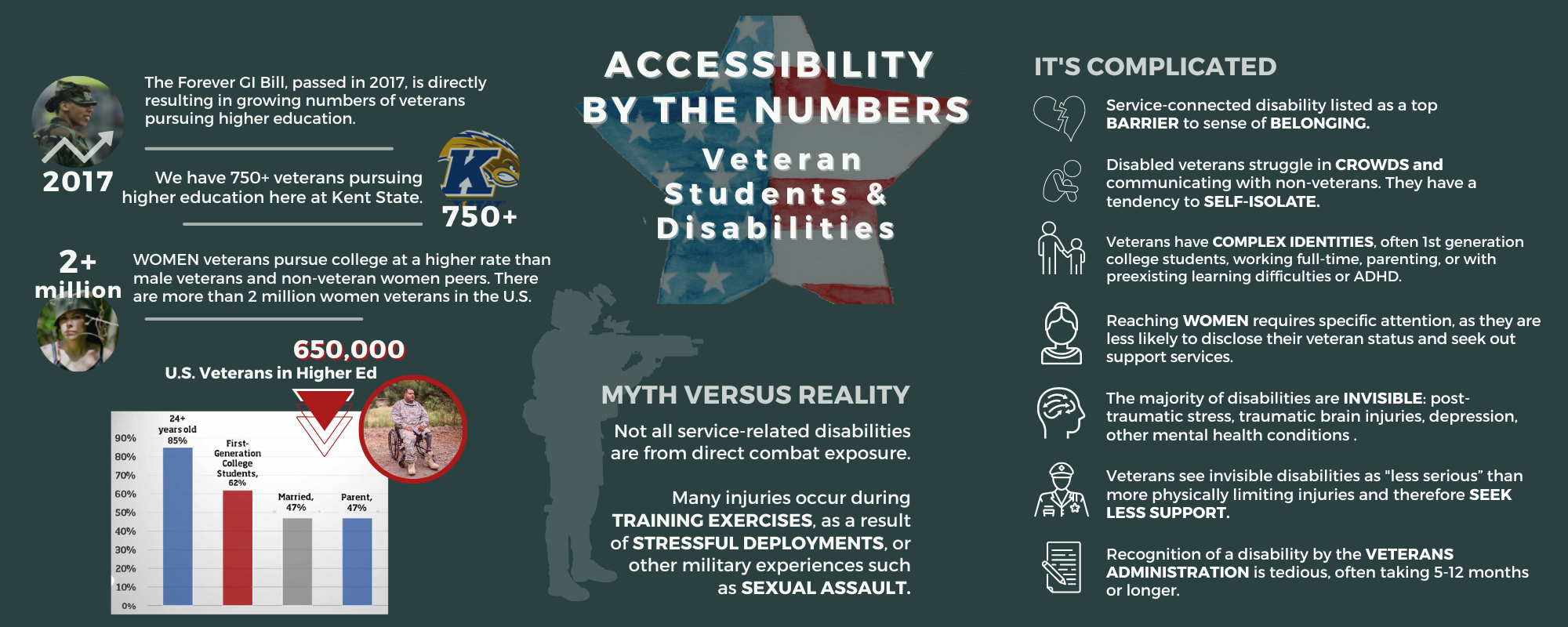READ THE ENTIRE NOVEMBER 2022 EDITION OF INSIDE EQUAL ACCESS
This article originally appeared in the November 2022 edition of Inside Equal Access.
By:
 Amanda Feaster
Amanda Feaster  Mykal Leslie
Mykal Leslie
Busting Myths and Building Communities for Veteran Students with Disabilities at ĚěĚěłÔąĎ State
“You Belong Here” is the message that greets all ĚěĚěłÔąĎ State students as they step foot on campus and begin their college journeys. While ĚěĚěłÔąĎ State remains dedicated to the mission of creating a welcoming environment for all students, for some, the sense of belonging doesn’t come quite so naturally. For the 650,000 student veterans nationwide and more than 750 student veterans at ĚěĚěłÔąĎ State, student veterans must balance families, jobs, and readjusting to civilian life while finding their place on campus. Being a veteran with a disability poses a unique set of barriers that are much different than those experienced by other veterans and other students with disabilities.
Statistics indicate that of the veterans in college: 
-
85% are 24+
-
62% are first-generation college students
-
47% are married
-
47% are parents
-
26% have a disability (NCES, 2020)
At ĚěĚěłÔąĎ State, we are extremely proud of our student veterans. We are working to ensure that there are services and resources available (see resource section) to assist with the challenging transition veterans with disabilities face when entering higher education. Joshua Rider, Executive Director of the Center for Adult and Veteran Services (CAVS) at ĚěĚěłÔąĎ State, is quick to remind veteran students that regardless of the cause of or type of disability, they earned the right to those services through their military service.
Student veterans at ĚěĚěłÔąĎ State can work with Student Accessibility Services (SAS) to receive accommodations for their disabilities. Classroom accommodations might include extended time for exams, a reduced-distraction testing environment, priority seating to reduce background noise or distractions, and assistance with notetaking. Each student reviews their disability with an Access Consultant to make sure that they are receiving accommodations that make sense based on how they experience their disability in the classroom. Students can indicate that they are interested in receiving accommodations from Student Accessibility Services when they complete their Intent to Enroll form, and they will be contacted by SAS with further information.
ĚěĚěłÔąĎ State has been named a Military Friendly school for 13 consecutive years earning Gold Status (top 5%) and being awarded the Collegiate Purple Star by the State of Ohio. “You Belong Here” are not just some words on a building, but a promise to partner with you or your loved ones to assist you in becoming a valuable member of our community and ultimately achieving your postsecondary and career goals.
Myth: Veterans with disabilities aren’t likely to enroll in college.
The number of veterans in college has increased over recent years and is expected to continue to rise as more veterans access the expanded education benefits from the “Forever GI Bill” passed in 2017 (Rattray et al., 2019). Two out of three student veterans has a disability recognized by the Veterans Administration, and one in ten considers that disability severe ()
Myth: Student veterans do not perform well academically.
This stereotype has been around since the first GI Bill was passed in 1944, despite student veterans consistently outperforming their peers. Student veterans persist and graduate at a higher rate and have higher GPAs than their nonveteran peers (, 2019).
Myth: Most veterans with disabilities obtained their disability in active-duty combat.
While physical and sensory disabilities are common in military veterans, it is important to remember that not all of these conditions are necessarily connected to a deployment or are related to a traumatic combat exposure. It is a misconception that all service-related disabilities are the result of direct combat exposure, as many injuries also occur during training exercises, as a result of stressful deployments, or other military experiences like sexual assault.

Myth: Disabled veterans have obvious physical disabilities.
It is also a misconception that a veteran with a service-connected disability would be easy to spot due to obvious physical or sensory impairment. A majority of service-connected disabling conditions are invisible, such as post-traumatic stress, traumatic brain injuries, depression, and other mental health conditions (Rattray et al., 2019; Umucu et al., 2019). These invisible conditions tend to pose some of the greatest difficulties due to the conditions not being obvious and veterans feeling uncomfortable disclosing health information or requesting needed accommodations. This is in addition to the impact of co-occurring invisible conditions such as learning disabilities or attention deficit/hyperactivity disorder (ADHD) that may have existed prior to military services (Madaus et al., 2009).
Myth: Student veterans know how to get accommodations for a disability.
Connecting student veterans with disabilities to accommodations and other support services is difficult for many reasons. Due to terminology used in the service, some veterans might readily identify as wounded rather than as disabled or as a person with a disability. This makes it less likely that this group will come to an office like Student Accessibility Services.
Others might view a non-combat-related or invisible condition as less serious than more physically limiting injuries and feel not as entitled to receiving services and supports. Many veterans are uncomfortable with disclosing health conditions and are not sure how to begin requesting services and accommodations. Many administrators, faculty, and staff at universities have limited experience working with student veterans and may not be aware of appropriate referrals.
ĚěĚěłÔąĎ State has been named a Military Friendly school for 13 consecutive years earning Gold Status (top 5%) and being awarded the Collegiate Purple Star by the State of Ohio.
Myth: Once they are in class, student veterans don’t face challenges on a college campus.
Disabled student veterans continue to overcome barriers throughout their time in college. While student veterans face many challenges in adjusting to college life, having a service-connected disability has been identified as one of the most substantial barriers to a student veteran’s sense of belonging and overall well-being. A recent study by Umucu and colleagues (2019) confirmed a growing body of evidence that suggests student veterans with service-connected disabilities have lower levels of overall well-being and college-life adjustment when compared to student veterans without disabilities. Veterans with cognitive impairments, mental health concerns, and post-traumatic stress experience more barriers with fitting in to college life and have a greater need for health and social services. Other challenges faced by veteran students with disabilities include physical and environmental barriers, coping with large crowds, seeking social support, communicating with non-veteran civilians, and a tendency to self-isolate (Rattray et al., 2019).
Myth: Most disabled veterans identify as male.
There are more than 2 million women veterans in the US, and women make up the fastest-growing group in the veteran population, according to the VA. In fact, women veterans pursue higher education at a rate higher than their male counterparts and their nonveteran women peers. While in college, women are less likely to disclose their veteran status and seek out support services (Albright et al., 2019). This means that reaching female student veterans with disabilities is even more challenging and requires specific attention.
How can you support veterans with disabilities at ĚěĚěłÔąĎ State?
Refer students or colleagues who disclose their disabled veteran status to the many resources available at ĚěĚěłÔąĎ State and within Portage County. The Center for Adult and Veteran Services and Student Accessibility Services are always happy to answer questions and provide referrals.
Attend Accessibility for Veterans on 11/29 at 1 PM to learn more about creating an accessible, inclusive environment for disabled veterans at ĚěĚěłÔąĎ State.
